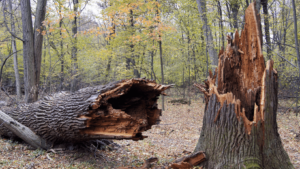On April 25, 2019, the Wynnfield Homeowners Association (HOA) filed a lawsuit against homeowner Karam Muzahem, accusing him of removing a tree from his property without first seeking approval from the HOA. The case was handled by attorney Tom Radcliff of Brady Radcliff & Brown LLP, the same legal counsel the HOA has relied on in numerous disputes with homeowners. This law firm has been involved in several controversial cases on behalf of the Wynnfield HOA board, fueling widespread criticism of the board’s aggressive and litigious approach to enforcing neighborhood rules.

Shortly after the lawsuit was filed, the parties involved agreed to have an independent arborist assess the tree in question. Additionally, the City of Mobile Tree Department conducted its own evaluation. Both the independent arborist and the city confirmed that the tree was dead and posed a significant safety risk, necessitating its removal. Despite this clear determination, the lawsuit had already resulted in substantial costs for both sides.
The HOA ultimately agreed to voluntarily dismiss the lawsuit. However, the board did not issue an apology to Muzahem for the ordeal, nor did it acknowledge that the lawsuit was unnecessary. The association also failed to notify its members about its decision to initiate the lawsuit in the first place or to provide any updates about its resolution. This lack of transparency and accountability left many homeowners frustrated and questioning the motives of their leadership.
Residents have expressed strong disapproval of the board’s decision to pursue legal action in this matter, especially given the financial implications. The lawsuit cost the HOA thousands of dollars in legal fees—money that comes directly from homeowner dues. It also forced Muzahem to incur significant legal expenses to defend himself, despite the tree being dead and removal being the logical and necessary course of action.

Critics argue that the lawsuit exemplifies the HOA board’s tendency to prioritize asserting its authority over employing common sense and engaging with homeowners in a constructive manner. Many believe the board’s actions reflect an oppressive, power-driven approach rather than a collaborative effort to ensure the community’s well-being. Homeowners have become increasingly vocal about their dissatisfaction with the board, questioning its judgment and accusing it of wasting resources on frivolous legal battles that could have been resolved through open communication and rational decision-making.
The case has further eroded trust between the HOA board and its members, with some residents calling for significant changes to the way the association is governed. For many, this incident highlights the broader issues of overreach, lack of transparency, and poor governance that continue to plague the Wynnfield HOA.
